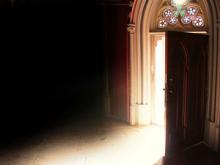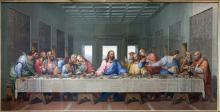Worship

Reading the Bible from the comfort of my couch, I find myself pointing fingers at individuals like Elijah. I can throw them under the bus for missing the point. It's easy for me to see how they got it all wrong. I'm amazed how apparent the presence of God can be one minute and the very next minute they sink deep into despair with this "woe is me" attitude — all the while thinking God has abandoned them.
But, as an onlooker, I have the privilege of seeing the whole story. I'm not living in the moment waiting for things to unfold. The Bible has extended to me the privilege of seeing the big picture, which makes it easy to see that while God is sometimes found on the mountain, or in those big cinematic experiences — conquering prophets, healing the sick, reviving the dead, conquering death — other times he is found in the valley, or in that still, small voice.
But then again, I have to wonder if I'm really any different? Don't I have the same struggles today? How often do I get caught up in the circumstances and lose sight of the big picture? I have some big mountain top experience — the money comes through, the deal works out, I got the job, my fear and anxiety dissipate, the mission trip is life changing, the sermon was exactly what I needed to hear — and, it never fails, the next minute I feel as though God has abandoned me. Doubts surface about whether or not God really has my best interest at heart. I wonder if he can even use someone as broken as me.
What causes such a drastic change?
After wrestling with this a little more, I came to a disheartening conclusion — I have a tendency to seek an experience instead of God.

On the second Sunday of Lent, John Hendrix sits in one of the pews near the back of Grace and Peace Fellowship, a Presbyterian church with stained glass in green and orange, and a giant, organ pipe front and center.
Casually decked in a striped, button-down shirt and jeans, he looks like any other member of the hip and young crowd. With his wife, Andrea, and his two children, Jack, 8, and Annie, 5, Hendrix stands and sings and partakes of gluten-free communion.
But as soon as the sermon starts, Hendrix sets himself apart, whipping out his sketchbook and pens to draw the pastor’s sermon.

Editor's Note: Last week, Sojourners’ Associate Web Editor Catherine Woodiwiss caught up with musical collective Gungor at South by Southwest in Austin, Texas. Here’s what Michael Gungor has to say about art, liturgy, and the future of music.
This interview has been edited for length and content.
Catherine: So what brings you to South by Southwest (SXSW)?
Gungor: I guess we thought it was about time to experience the circus.
Catherine: A couple of years ago there was talk of SXSW becoming a destination for "Christian techies,” and Donald Miller premiered his popular film, Blue Like Jazz, at the film portion of the festival. Do you consider yourself part of a Christian “witness” here at SXSW?
Gungor: We are here to make some music, have a good time, and perhaps make some friends along the way. We certainly aren't here to proselytize or advance some secret religious message or anything.
But anywhere we go, we do have a desire to live the sort of life that Jesus invited people to live.

Recently, a large wealthy church decided to break up with my denomination. I’m not 100 percent sure I know why. But the no-regrets explanation they wrote implied that religious differences between us were too severe for them to stay committed to our relationship.
Religion has a way of making people do extraordinary things to create peace and unity. It also, as we know well, has a destructive capacity to turn people against one another. It can make us grip our convictions so tightly that we choke out their life. We chase others away, then say “Good riddance” to soothe the pain of the separation. Even more alarming, too many religious people insist on isolating themselves and limiting their imagination about where and how God can be known.
All these realities take on a sad irony when we read about God promising to be outside the walls, present with different people in different places. What does it look like when God defies the restrictions we presume are in place?

And as I worshiped I realized creation wasn’t singing with me. I had entered into creation’s ongoing worship of God!
But Scripture speaks of another utterance of nature — a groaning. (Romans 8:19-22) Even as creation worships, it bears the weight of our sin. Our addiction to consumption, our oil drills and oil spills, and our depleted uranium bullets whizzing through theaters of war in countries ravaged, torn apart — both the people and the land. Creation is groaning, even as the trees lift their branches heavenward in worship.
The Genesis 2 story of creation offers a profound picture of humanity’s relationship with the rest of creation in the beginning. In Genesis 2:15 God called humanity to till and keep the Garden of Eden. The Hebrew word for “till” (‘abad) is also translated “to serve” (as a bond servant). The Hebrew word for “keep” (shamar) is most accurately translated “to protect.” Thus, we were called to serve and protect the rest of creation. In the very beginning of our existence, we related to the land as its servants — its protectors. That relationship was full of care, nurture, security, and selfless service.

It was a busy weekend on the eve of Lent for fans of spirited singer and spiritually-minded musician Michael Gungor. If you were not on the Gungor or Michael Gungor Twitter feed over the first two days of March, you might have missed the news about a new band, a new record, and a new mini-tour.
As the band called Gungor takes a short break from touring in support of its sonically and lyrically adventurous album I Am Mountain, the family business has reinvented itself with the proverbial “side project” so common with musical visionaries who cannot contain their creative output to just one brand name or band name.
But The Liturgists — a collective that includes Michael’s wife Lisa, brother David, and a host of other supporting musicians and collaborators — are not just another band, and the brand is “the work of the people.” The band’s Vapor EP is a warm and experimental worship text that includes a song, a spoken-word invocation and incantation, and a guided centering prayer meditation. On the group’s Ash Wednesday-week mini-tour, all the shows are free by RSVP and are not really shows as at all — not as indie-consumers even in the contemporary Christian scene have come to expect.

Tuesday was a big day here in Washington, D.C. The president of the United States addressed both houses of Congress and the Supreme Court, laying out his State of the Union. In this annual speech, the President lays out his vision of where the country is at, and where we are headed. With great pomp and circumstance, the Commander-in-Chief delivers a message for the whole nation.
Tuesday night was a big moment for my community, too. The D.C. small group of Friends of Jesus gathered for our first small group meeting of 2014. We caught up with one another after many weeks apart. We experienced the story of Acts 2 in the form of a bibliodrama that we acted out together. We shared a time of deep worship and prayer.

EXECUTE: TO ENACT OR DO. Having grown up in inner-city Chicago, I have fond memories of red fire hydrants, swinging jump ropes, and church robes. During summer, the fire department would open the hydrants. Parents granted the petitions of children to run through the streams of water, soaking our clothes and cooling our backs. And while I never achieved the rhythmic agility to jump Double Dutch, I loved to recite the rhymes, which eventually helped me gain a verbal dexterity like that of my pastor. I wanted one day to have a robe like hers—one that signaled that the words I spoke revealed the reign of God.
Turn the clock back. Some children would hold very different memories of fire hydrants, ropes, and robes. In Birmingham, Ala., in1963, the force of the water injured petitioners for freedom. During the American Revolution, a Virginia justice of the peace named Charles Lynch ordered extralegal punishment for Loyalists to the Crown. The swinging rope became the tool of mob violence. And the “hooded ones” continue to use the label of “Christian” to make a mockery of the vestments of clergy.
Fire hydrants. Ropes. Robes. Execute: to eliminate or kill. Meaning conveyed to the hearer may not at all resemble the intention of the speaker. Often communication requires suspension of what we think in order to listen to the context from which the speaker shares. Reading is no easier a task. Sometimes the same letters forming the same word present entirely different meanings. Justice executed. What does it mean?
The context for the next four weeks exposes what the Lord’s justice requires.

In the perfection of hindsight, I see that I was clueless when I knelt before the Episcopal bishop of Indianapolis on a snowy December night 36 years ago and claimed my prize: ordination as a priest.
I had no clue how to serve a congregation. Other than planning Sunday worship — the easiest of all clergy tasks — I was unprepared.
How to make a hospital visit; how to lead a council whose only instinct was not to spend money; how to grow a church; how to comfort the lost and to humble the found; how to hear what the world needed from us — I knew none of it.

Online resources
CHRISTMAS, ON THE surface, looks like the most wonderful time of year—the season of love, lights, carols, candles, and family reunions, the time when Christians celebrate the birth of Jesus Christ. Look a bit deeper, though, and one might notice a more idolatrous narrative shining just as brightly: consumerism.
From Black Friday to New Year’s Day, we are inundated with the commercial demands of Christmas. For many, the list of things to do and gifts to purchase can seem endless. We buy into the mantra that the more money we spend, the more love we convey. We become lost in crowded stores, endless websites, and credit card debt. Christians often struggle to faithfully observe Advent, a time of waiting and preparation for the miraculous birth of Jesus.
While many of us purchase this spurious version of Christmas, a new movement has been born. It’s called Advent Conspiracy (AC), and its participants are seeking to turn Christmas upside down by exchanging consumption for compassion.
“Advent Conspiracy is not a four-point checklist on how to do Christmas. If anything, it’s a chance for us to rediscover the wonder and the mystery of the incarnation and what that means to us personally and what that might mean for the world,” said Greg Holder, lead pastor of The Crossing church in the St. Louis area.

I’m often asked about what trends I see within Christianity, both good and bad. So in my ongoing effort to help name trends and offer an alternative way of thinking about our faith, here are the five biggest things I’ve seen that tend to keep us from doing our best work as the living, breathing body of Christ in the world today.
1. Church Buildings — Many of our church buildings were established in a time when Christianity was booming numerically in the United States. We could hardly keep up with the growth happening all around us. Understandably, churches popped up where the people were too, drawing many away from their old downtown churches to a more convenient suburban community. But as our numbers have dwindled – combined with the fact the we’re a much more mobile society now that ever before – many churches are becoming monuments to what has long since passed. They have become an albatross rather than an asset.

Mumford and Sons opened with a little introit called "Sigh No More" then a call to worship, "Roll Away Your Stone" and so we did. Understated and, dare I say it, reverent. Polished and yet still "honest" (this is a hipster liturgy, after all), the boys did a great job offering their work to us. They spoke with the audience. Marcus jumped off stage to give a beer to a woman celebrating her 21st birthday and then led the crowd in singing "Happy Birthday" to her. Welcome to a living room that seats 8,500.
The band played most of their published stuff, took a bow, and walked off stage. The encore set is what took it home for me. The stepped away from their usual set-up, unplugged their instruments, stood around a condenser mic and then sang. They dragged us back into devotion. Springsteen's "I'm On Fire" followed by "Sister" sung a cappella did me in. A benediction? Perhaps I'm reaching.
They closed the night with "The Cave" which had people jumping and singing along. You can find a set list here.
After the concert, my Facebook feed lit up with "it was just like church" or "that was church" by several people including some ordained church types in attendance last night. The Vineyard background has not been wasted, not by any stretch. It has been given a new venue, a new form, a venue where the truth can be sung in quiet tones, where no name is taken in vain or otherwise, where wild passion is replaced with festal devotion.

Life is difficult. It can knock you down. Sometimes, an entire nation gets knocked down.
First it was Boston. Some mad man (or men) lays waste to one of America’s most hallowed sporting events — the Boston Marathon. Sidewalks that should have been covered with confetti were covered in blood.
Then it was the quintessential small Texas town of West. Populated by hearty Czech immigrants, folks in West worked hard in their shops, bakeries, and fertilizer plant until the plant exploded. A magnitude-2.1 on the Richter scale, witnesses compared it to a nuclear bomb. Dozens are feared dead.
In the nation’s capital, we had the bitter realization that something is broken that will not be easily repaired. A commonsense proposal that emerged from the Newtown, Conn., tragedy, background checks to prevent convicted felons and the seriously mentally ill from purchasing guns online or at gun shows, fell prey to Washington gridlock. None of the Newtown proposals — the ban on assault weapons, limits on the number of bullets a gun can hold or expanded background checks — could garner the 60 votes necessary to overcome a Senate filibuster.
Finally, there were the ricin-laced letters sent to a Republican senator and the president.

"EVEN IF I OWNED Picasso's 'Guernica,' I could not hang it on a wall in my house, and although I own a recording of the Solti Chicago Symphony performance of Stravinsky's 'Rite of Spring,' I play it only rarely. One cannot live every day on the boundary of human existence in the world, and yet it is to this boundary that one is constantly brought by the parables of Jesus." So wrote a great New Testament scholar, Norman Perrin, in his book Jesus and the Language of the Kingdom. I often think about his frankness as I prepare for the transition between Epiphany and Lent. We must soften and make bearable the intensity of the scriptural story to face it every week in church. We can't dive to the depths every single week, and we are right to keep our child-friendliness going.
But we need to risk depth and passion, or run the danger of making the gospel seem boring and predictable. Our churchly betrayal of God lies in our willingness to make the Word seem banal. So perhaps the thing we need to give up for Lent is our avoidance of depth. The scriptures this month will speak to us of faith as the experience of being stressed almost to a breaking point. They will plumb the depths of divine frustration and disappointment. We must clear a space for these wounding and thrilling themes and suspend our strategies for making worship palatable and safe.

I’ll preface this piece my saying I know I am making some broad generalizations based on gender, and that there are always exceptions to every trend. But despite that, I do think there are some cultural trends that can offer us some useful insight.
Anyone who has been paying attention has noticed that, of those left within the walls of most churches, the majority still hanging in there are women. Some, like the advocates of so-called Masculine Christianity, see this as a crisis. The Christian faith and its symbols are becoming softened, feminized, compromised into being something other than what they were meant to be.
Granted, when you take a faith whose principal authors historically have been men and then place that same faith in the hands of women, some things will inevitably change. Personally, I welcome the exploration of other, feminine expressions of the divine and values such as embodied spirituality that many female Christian leaders value. But aside from these assets, I think that women bring something far more critical to institutional religion.
Without them, it may cease to exist.

I empathize with people fleeing the local church. Churches can be battlefields instead of harbors, pits of condemnation or politics rather than wells of living water.
But the endless search for something “new” has trumped the life-changing story the body of Christ has nurtured and passed on for 2,000 years. This transforming story is the story the churches enacted weekly in Word and Sacrament before they forgot their original vocation as shelters of truth, life, and light amidst lies, death, and darkness. There were four revealed ways Jesus was present at the center of their public gatherings. These ways have been lost in too many places but are waiting to be rediscovered. More on that in a moment.
A young woman, a house church attendee, told me she longs for solid pastoral guidance, a message prepared weekly by an authoritative teacher, for worship that places Jesus Christ at the exact center of a public space where everyone is welcome, a place where she can bring her disbelieving friends whose lives are not yet transformed by self-sacrificial Love, a place where they can speak openly and honestly about where their lives still remain isolated from a holy God, a place of worship that does not lean on any one person's (or her personal) understanding and articulation of the Gospel but on the collective wisdom of the body of Christ.

It's been a very musical weekend.
Pictured at left is a Foster 7-string guitar. It's just like a traditional 6-string acoustic, but with the added rumble of a low-b string. It's an interesting beast to play. Lovely, really. I like that extra resonance in the low end, plus, if truth be told, I like singing with it. Here is a little recording from Soundcloud. I recorded the file below on my phone. Any tinnyness is purely because of the phone.

I used to be in a fantasy league, but the fanaticism of the whole thing wore me out. The guys would gather online for an evening-long draft event, debate rules ad nauseam, and haggle over trades through the wee hours. I considered myself to be a fan, but these guys had practically made, well, a religion out of fantasy sports.
I was reading a piece today by Bruce Reyes Chow about what we Christians might learn from fantasy sports, and it got me thinking. One of the most interesting things being in the fantasy league did for me was that it totally changed how I watched the games. I would turn on games I never would have had interest in before, just to see how my selected running back performed. I even found myself rooting against my own favorite teams once in a blue moon when it served my fantasy team and didn’t affect the outcome of the actual game.
The whole experience drove my wife crazy, partly because of all the time it took, but also because the way I engaged sports was so different that, even if we were watching the same game, it was as if we saw two completely different things.
We’re in the middle of a similar kind of shift in the west with respect to organized religion. While folks within the walls of church may be intent primarily on keeping the institutions placed under their care alive, a growing majority of people outside the doors don’t really care about the denominational logo over the entryway, the name inscribed on the stone sign by the street or the long, rich history of all the congregation has meant to the community.
